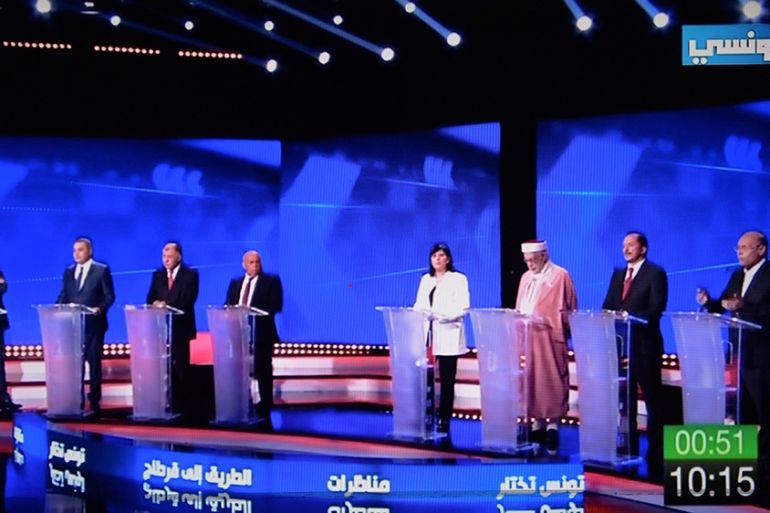Tunisia airs first ‘great debate’ ahead of presidential vote
Three nights of televised debates between the presidential candidates are a highlight of the election campaign.

Days before the first round of Tunisia‘s presidential election, the first of three televised debates between the candidates has aired, a rare event in the Arab world.
The showdown between the 26 hopefuls over three nights is seen as the highlight of the campaign and a turning point in Tunisian politics ahead of the vote on September 15.
Keep reading
list of 4 itemsKey takeaways from day 18 of Donald Trump’s New York hush money trial
Chad’s Mahamat Deby confirmed as winner of disputed presidential election
Why are protests against France raging in New Caledonia?
Called “The road to Carthage: Tunisia makes its choice”, the programme was broadcast on Saturday on 11 television channels, two of them public, and about 20 radio stations across the country that spearheaded the so-called Arab Spring revolutions in 2011.
Tunisia has since been considered by some as a rare success story for democratic transition after the uprisings.
“We won’t be able to escape it,” said a smiling Belabbes Benkredda, founder of the Munathara Initiative, which promotes open debate in the Arab world and helped organise the event.
Eight candidates, one empty space
The first hour-and-a-half debate on Saturday night involved eight of the candidates, including Abdelfattah Mourou who is interim parliamentary speaker and Ennahdha Party vice president, and Abir Moussi, head of a group with roots in the party of longtime deposed ruler Zine El Abidine Ben Ali.
There was also an empty space for controversial media mogul Nabil Karoui, the owner of Nessma TV who is currently detained on money laundering charges, whose participation was confirmed last week by the electoral commission last week.
“Tonight I am deprived of my constitutional right to express myself in front of the Tunisian people,” Karoui wrote on Twitter.
“They dare to speak of democratic and transparent elections despite the absence of the basic principle of equal opportunities.”
Parliament passed a controversial law in June that prevented Karoui from running for the presidency on account of his ownership of a television station that he allegedly used to promote his philanthropic work, giving him an advantage over other candidates.
Late Tunisian President Beji Caid Essebsi, however, refused to ratify the law before he died in July.
The stage, at the studios of public TV channel Wataniya, placed candidates in a semi-circle with two journalist moderators at the centre.
The questions were set by the journalists and randomly selected and allocated to candidates on Friday.
Each candidate had 90 seconds to respond to a question and could be asked a follow-up question or be interrupted.
At the end of the show, candidates were given 99 seconds to outline their manifestos and campaign promises.
Security and the economy are among the top challenges facing the contenders.
Tunisia has seen a wave of violence near its border with Algeria, where the threat of armed groups is still prominent.
Joblessness is another challenge, with the unemployment rate hovering above 15 percent and standing at more than 30 percent in some of the marginalised interior regions.
‘Open competition’
Beyond the organisational and technical elements of the debate, organisers highlighted the rare nature of the event.
“Often in the Arab world, when we speak of competition, we know who wins at the end, with 99.99 percent. Today, we don’t know who is going to win,” Lassad Khedder, head of a private TV channel, told AFP news agency.
“Tunisian voters haven’t yet decided,” political analyst Ziyed Krichen told AFP.
Thousands of votes one way or the other “could radically change” the country, he added.
The upcoming election will see the participation of some of the biggest names in Tunisian politics.
Among the 26 candidates are Prime Minister Youssef Chahed, Defence Minister Abdelkarim Zbidi, Mourou, and former President Moncef Marzouki.
The plethora of candidates, political programmes and issues, has led to a uniquely unpredictable election.
Many Tunisians say they are counting on the debates to help them make their decision.
“It’s unprecedented. As a Tunisian journalist, I am proud and impatient to see this,” said Monia Dhouib, a member of the organising committee.
But such debates are not entirely without precedent in the region.
In 2012, 15 months after the overthrow of former Egyptian President Hosni Mubarak, Egypt organised an historic televised debate between the two favourites among 13 candidates running for president.
The winner of that election, the Muslim Brotherhood’s Mohamed Morsi, was deposed by the army following massive protests a year after he took office.
Benkredda of the Munathara Initiative said “the culture of debate doesn’t yet have a place in the Arab world”, but noted that the Tunisian debates will also be broadcast by channels in Iraq, Algeria and Libya.
The hope is, he said, that this “first step will serve as inspiration” for other Arab countries.
Analysts have noted that in the upcoming vote, it is unlikely any candidate will obtain a majority, meaning the second round of voting should take place in November, after October parliamentary elections.